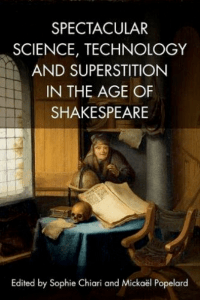Spectacular Science, Technology and Superstition in the Age of Shakespeare, Sophie Chiari and Mickaël Popelard (eds.)
Edinburgh University Press, 2017
288 pages. ISBN (Hardback) : 9781474427814
Editors:
- Sophie Chiari, Professor at Université Blaise Pascal, Clermont-Ferrand, France.
- Mickaël Popelard, Associate Professor at Université de Basse-Normandie, Caen, France.
 The volume explores the interaction between science, literature and spectacle in Shakespeare’s era.
The volume explores the interaction between science, literature and spectacle in Shakespeare’s era.
To the readers who ask themselves: ‘What is science?’, this volume provides an answer from an early modern perspective, whereby science included such various intellectual pursuits as history, poetry, occultism and philosophy. By exploring particular aspects of Shakespearean drama, this collection illustrates how literature and science were inextricably linked in the early modern period. In order to bridge the gap between Renaissance literature and early modern science, the essays collected here focus on a complex intellectual territory situated at the point of juncture between humanism, natural magic and craftsmanship. It is argued that science and literature constantly interacted, thus revealing that what we now call ‘literature’ and what we choose to describe as ‘science’ were not clear-cut categories in Shakespeare’s days but rather a part of common intellectual territory.
Key Features
- Analyses different aspects of Shakespeare’s plays through the prism of early modern science
- Sheds fresh light on major works such as the Sonnets, Love’s Labour’s Lost, Romeo and Juliet, Twelfth Night, King Lear, Hamlet, Othello, Macbeth, The Tempest, The Winter’s Tale
- Combines theoretical views, historical approaches, and close readings
- Offers an innovative dialectic vision of the Shakespeare/science nexus, taking up Mazzio’s seminal idea that it is now necessary to “move beyond forms of analysis focused largely on thematic traces of, or indeed linguistic reflections of, historically specific arenas of scientific practice”
- Links science and spectacle and posits that early modern theatre fashioned the reception of early modern discoveries
- Pays attention to systems of thought which bind together scientific and literary discourses, practices and mentalities within a single episteme (in Michel Foucault’s interpretation of the word)